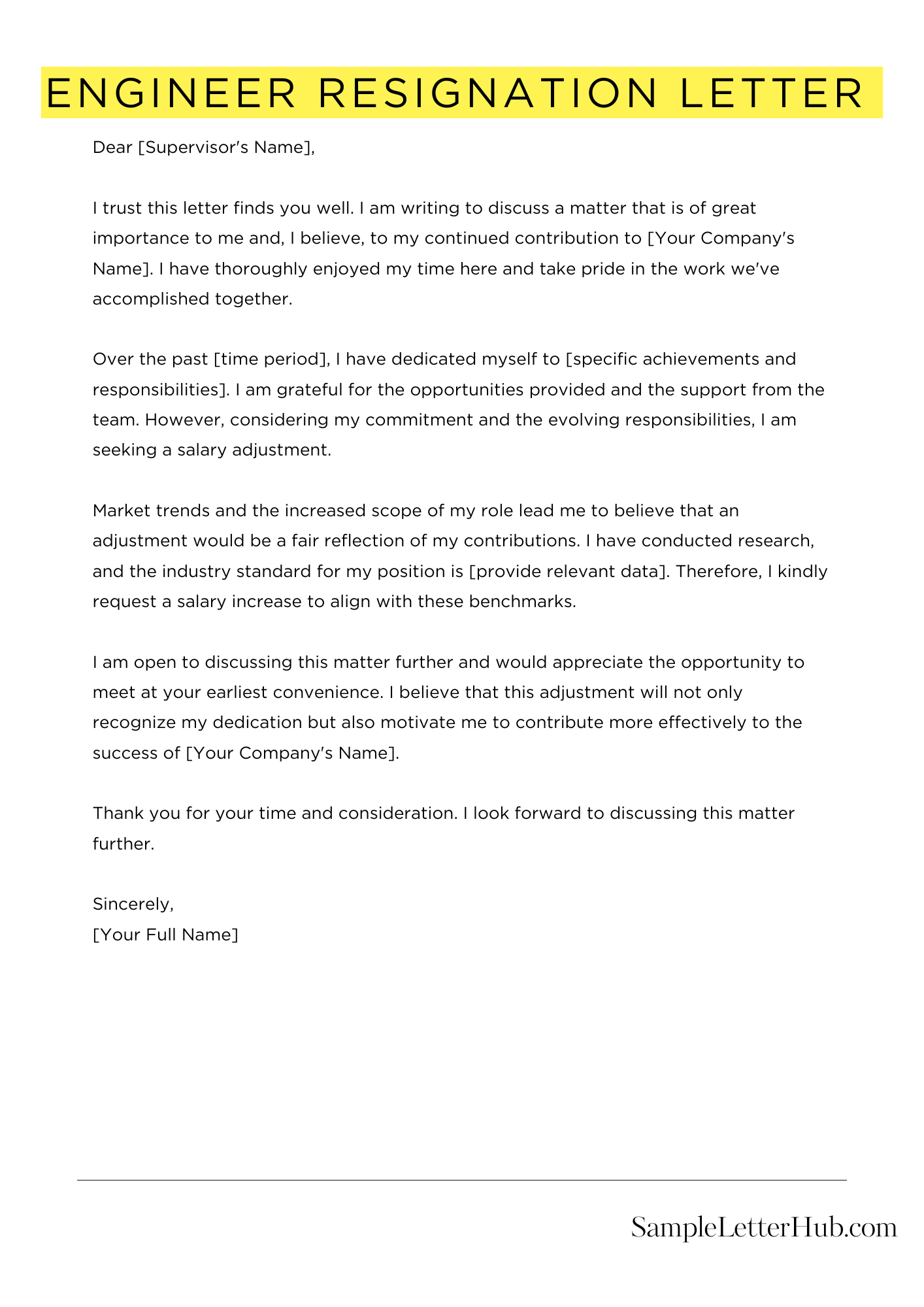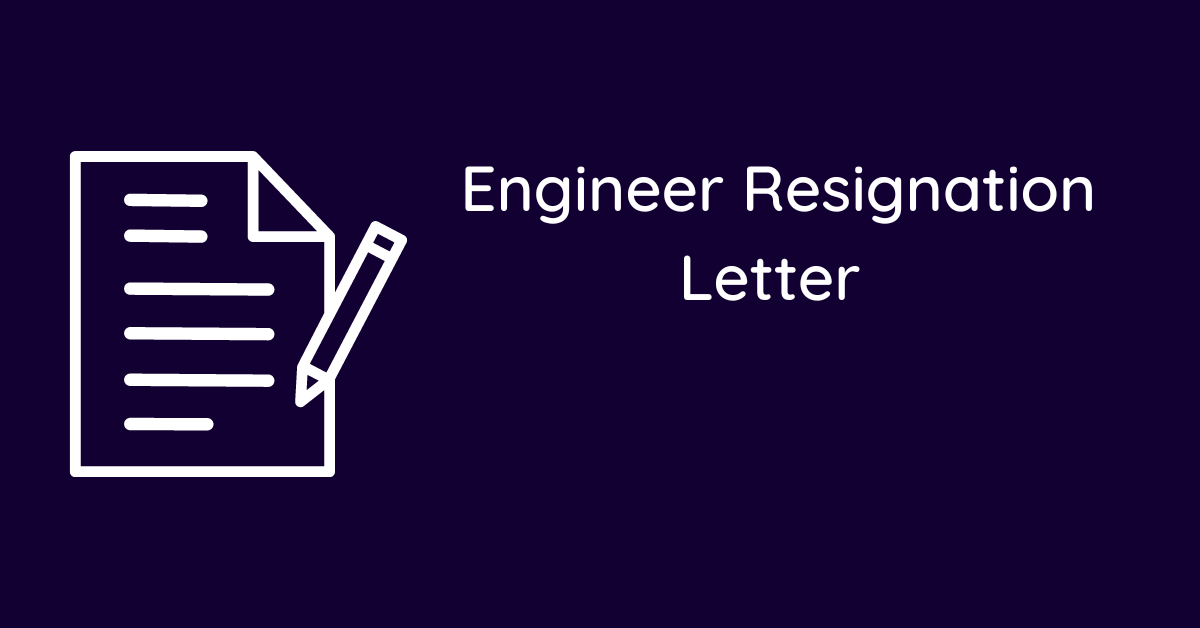When it comes to leaving a job, writing a clear and professional resignation letter is a must. It’s your chance to explain your decision to leave and express your gratitude for the opportunity to work at the company. While it can be daunting, it’s important to remember to be polite and humble in your tone.
One way to make the process easier is to use a template or example letter. This can help you get started and ensure that you include all the necessary information. Below, we’ve shared a sample engineer resignation letter that you can use as inspiration.
Remember, a well-written resignation letter can leave a positive impression on your employer and help you maintain a good relationship with the company in the future. So take your time, be thoughtful, and make sure your letter is a reflection of your professionalism.
Engineer Resignation Letter
Dear [Manager’s Name],
Please accept this letter as formal notification that I will be resigning from my position as [Your Position] at [Company Name], effective two weeks from today, [Last Date of Employment].
During my time at [Company Name], I have gained invaluable experience and knowledge that I will cherish. I am grateful for the opportunities and support I have received.
I would like to express my sincere appreciation for your guidance and mentorship. I have learned a great deal from you and your leadership.
I wish you and [Company Name] all the best in the future.
Sincerely,
[Your Name]
Short Engineer Resignation Letter Sample
Please accept this letter as formal notification that I am resigning from my position as Engineer at [Company Name]. My last day of employment will be [Your Last Day]. Thank you for the opportunity to grow and learn during my time here. I wish you and the company continued success. I am happy to assist in the transition process to ensure a smooth handover of my responsibilities.
I wish you all the best with your engineer resignation letter.
When it’s time to say farewell, expressing your gratitude and best wishes can make the transition smoother:

How to Write an Engineer Resignation Letter
1. Start with a Formal Introduction
Begin your letter with a formal salutation, such as “Dear [Manager’s Name].” Clearly state your intention to resign from your position as an engineer at the company. Include the date of your last day of employment.
2. Express Gratitude and Appreciation
Take this opportunity to express your gratitude for the opportunities and experiences you have gained during your time with the company. Highlight specific projects or accomplishments that you are particularly proud of.
3. State Your Reasons for Leaving
While it is not necessary to go into excessive detail, you can briefly state your reasons for leaving. Be professional and respectful, even if you are not entirely satisfied with your current situation.
4. Offer to Assist with the Transition
Demonstrate your commitment to a smooth transition by offering to assist in any way possible. This could include training your replacement or providing documentation on your projects.
5. End with a Professional Closing
Conclude your letter with a formal closing, such as “Sincerely,” followed by your typed name. You can also include a handwritten signature for a more personal touch.
Engineer Resignation Letter: 6 Frequently Asked Questions
Engineer resignation letters are a crucial part of the professional transition process. Here are six frequently asked questions and answers to guide you in crafting an effective resignation letter:
1. What is the proper format for an engineer resignation letter?
Engineer resignation letters typically follow a formal business letter format. Include your name, address, date, company name, and recipient’s name. Start with a clear statement of your intent to resign, followed by your last date of employment. Express gratitude for the opportunity and state any relevant details or reasons for leaving. Conclude with a professional closing and your signature.
2. How much notice should I give?
The standard notice period for engineers is two weeks. However, it’s advisable to provide as much notice as possible, especially if you have significant responsibilities or projects in progress. This allows your employer ample time to prepare for your departure.
3. Do I need to state a reason for leaving?
While it’s not mandatory to provide a reason for leaving, it’s generally considered good practice to do so. Be brief and professional, focusing on positive aspects such as career growth or personal reasons. Avoid negative comments or criticisms.
4. Can I negotiate my departure date?
In some cases, you may be able to negotiate your departure date with your employer. This is especially true if you have a critical project or deadline approaching. Be prepared to provide a valid reason for your request and be willing to compromise.
5. What should I do if I have any outstanding projects or tasks?
It’s important to ensure a smooth transition during your departure. Before submitting your resignation letter, take steps to document your current projects and responsibilities. Offer to assist in training or delegating tasks to ensure continuity.
6. Can I use a resignation letter template?
While there are many resignation letter templates available online, it’s best to tailor your letter to your specific situation. Use professional language and proofread carefully before submitting it.
Before making the decision to resign from your job, it’s essential to consider the legal aspects:
Understanding your emotions after quitting your job is important. Explore why you might be feeling sad:
Related
- Resignation letter sample
- Forced resignation letter
- Resignation letter due to going abroad
- Resignation letter due to marriage
- Resignation letter due to other opportunity
- Resignation letter due to mistake

